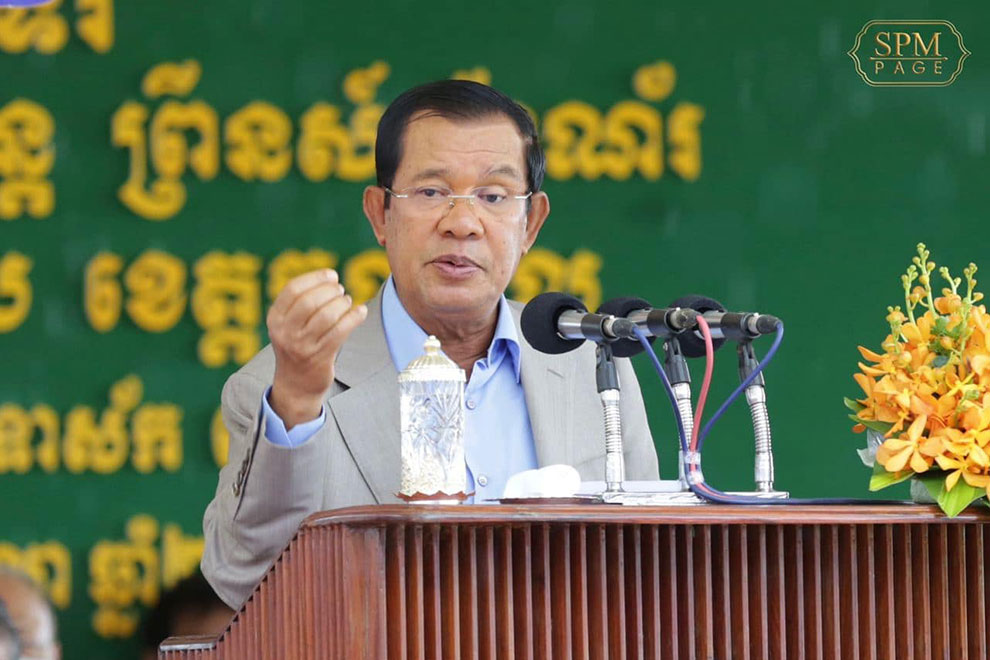Prime Minister Hun Sen on October 7 posed a question to countries that have been critical of Cambodia’s acceptance of Chinese aid, saying he would consider stepping down from office if any of his critics can name a country that can replace China’s assistance in building infrastructure.
Hun Sen’s statement was in response to criticism by other superpower nations that Cambodia is a puppet of China, and comes amid rising concerns that the government is planning to grant China exclusive access to Ream Naval Base in Preah Sihanouk province.
Speaking at the inauguration of an $85 million amusement park funded by a Chinese company in Kandal province, the prime minister said that some nations have been critical of what they see as Cambodia’s pivot toward China.
“I would like to ask that, if China doesn’t build roads and bridges, who will instead?” he said.
“[We] question that if China does not intervene to help [develop infrastructure] who will? Please answer me,” Hun Sen said.
“If you can answer me, I can say that I should step down from the position,” he said, going on to say that although critics had spoken out, no action had been taken.
Hun Sen’s criticism of other “superpower” countries seemed to be a reference to the United States, after it was reported earlier this month that Cambodia had demolished a U.S.-funded building at Ream Naval Base. In his speech, the prime minister again denied previous allegations that Cambodia would give China exclusive rights to the base.
“It is a naval base that requires permission [to use], and it is not only China that has the right to use it, but other countries can use it too if they have asked permission to dock … or disembark to conduct joint military exercises with Cambodia,” Hun Sen said.
The Wall Street Journal reported last year that Cambodia and China had signed a secret agreement allowing Chinese armed forces to use the base as Beijing makes efforts to boost its claims to valuable resources and territory in the nearby South China Sea.
US Embassy spokesperson Chad Roedemeier said via email on October 7 that the Embassy was disappointed in the destruction of the US-funded facility at Ream.
“We are disappointed that Cambodian military authorities have chosen to demolish a maritime security facility that is only seven years old and was a sign of US-Cambodia relations,” he said.
“We have concerns that razing the facility may be tied to plans for hosting People’s Republic of China military assets and personnel at Ream Naval Base. Such a military presence would negatively impact the US-Cambodia bilateral relationship and be disruptive and destabilizing to the Indo-Pacific region,” Roedemeier said.
He also referenced a November 2019 letter in which US President Donald Trump opened the door to discussing ways to increase US-Cambodia cooperation that would protect the sovereignty of Cambodia.
“We would welcome a dialogue about Cambodia’s needs, and to identify how we can support infrastructure at Ream that would benefit an independent Cambodia and all nations supportive of a free and open Indo-Pacific,” he said.
Meas Soksensan, a spokesman at the Ministry of Finance and Economy, said that Cambodia has the right to make its own decisions regarding what foreign aid to accept.
“It is Cambodia’s sovereign right, so if Cambodia can find a loan, according to the law we will follow the conditions of the loan,” he said.
Political analyst Em Sovannara said Cambodia should maintain relations with other donor countries, noting that developing states like Cambodia need assistance from many parties, not just China.
“It is better when we have loaned from many others, but it is also a burden upon the state if it does not have not the ability for repayment,” he said.
“They [the US] are worried that Cambodia will be under the influence of China because the Cambodian Constitution stipulates that as a neutral country, foreign military bases are not allowed on Cambodian territory,” Sovannara said.
Until recently, Japan was the largest aid donor to Cambodia, followed by the United States and the Asian Development Bank.
According to data from the Ministry of Economy and Finance, Cambodia has borrowed more than $4.95 billion from China as of June 30 this year, while Japanese aid totaled $1.69 billion in that time.








